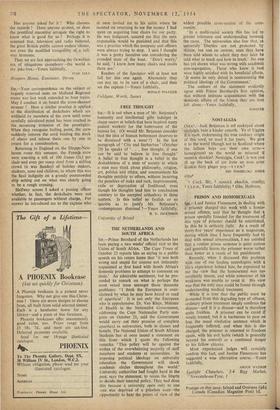THE NETHERLANDS AND SOUTH AFRICA
SIR,—Prince Bernhard of the Netherlands has been paying a two weeks' official visit to the Union of South Africa. The Cape Times of October 23 reports him as saying in a public speech on his return home that ' it was both wrong and stupid for anyone not intimately acquainted at first hand with South Africa's domestic problems to attempt to comment on them.' An admirable sentiment, but he pro- ceeded to remark on what is perhaps the most vexed issue amongst those domestic problems: 'I think the European is over- alarmed by what he may have heard or read of apartheid.' It is not only the European who is apprehensive. Dr. Van Rhijn, Minister of Health in the Nationalist Government, addressing the Cape Nationalist Party con- gress on October 21, said the Government would carry out their promise of complete apartheid in universities, both in classes and hostels. The National Union of South African Students has at once issued a statement on this from which I quote the following remarks. 'This policy will be against the wishes of the overwhelming majority of staff Members and students at universities. In imposing political ideology on university education the Government will shock academic circles throughout the world.' University authorities had fought hard in the past, says the statement, to retain the liberty to decide their internal policy. They had ddme this because a university open only to one race was deprived of a priceless asset--the opportunity to hear the points of view of the widest possible cross-section of the com- munity.
In a multi-racial society this has lcd to greater tolerance and understanding betwecti the races. The universities also fear that, a$ university 'liberties are not protected by statute, but rest on custom, once they have been told whom to admit they may later be told what to teach and how to teach.' No one has yet shown what was wrong with academie non-segregation. Those who knew it best were highly satisfied with its beneficial t.trects. It seems its only defect is contravening the political ideology of the Government.'
The authors of the statement evidently agree with Prince Bernhard's first opinion, that without intimate acquaintance with the domestic affairs of the Union they are best left atom—Yours faithfully,
WINSTER


































 Previous page
Previous page